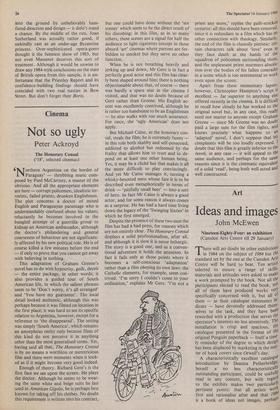Cinema
Not so ugly
Peter Ackroyd
The Honorary Consul ('18', selected cinemas)
titijorthern Argentina on the border of j11 Paraguay' — throbbing music com- posed by Paul McCartney, a master of the obvious. And all the appropriate elements are here — corrupt policemen, idealistic ter- rorists, failed priests, drunken Englishmen. The plot concerns a doctor of mixed English and Paraguayan parentage who is understandably confused about his values; reluctantly he becomes involved in the bungled attempt of a guerrilla group to kidnap an American ambassador, although the doctor's philandering and general coarseness of behaviour are not significant- ly affected by his new political role. He is of course killed a few minutes before the end
— if only to prove that you cannot get away with believing in nothing.
This adaptation of Graham Greene's novel has to do with hypocrisy, guilt, deceit
— the entire package, in other words; it also provides a guided tour of South American life, in which the salient phrases seem to be 'Don't worry, it's all arranged' and 'You have my guarantee'. The local detail looked authentic, although this was perhaps because it was filmed on location in the first place; it was hard to see its specific relation to Argentina, however, except for a reference to 'the disappeared'. The setting was simply 'South America', which remains an amorphous entity only because films of this kind do not perceive it in anything other than the most generalised terms. Yet, having said all that, The Honorary Consul is by no means a worthless or meretricious film and there were moments when it look- ed as if it might become very good indeed.
Enough of theory. Richard Gere's is the first face we see upon the screen. He plays the doctor. Although he seems to be wear- ing the same white and beige suits he last used in American Gigolo, he is perhaps best known for taking off his clothes. No doubt this requirement is written into his contract,
but one could have done without the 'sex scenes' which seem to be the direct result of his disrobing: in this film, as in so many others, these scenes are a signal for half the audience to light cigarettes (except in those absurd 'art' cinemas where patrons are for- bidden to smoke) but they serve no other function.
When he is not breathing heavily and jerking up and down, Mr Gere is in fact a perfectly good actor and this film has clear- ly been shaped around him; there is nothing objectionable about that, of course — there was hardly a spare seat in the cinema I visited, and that was no doubt because of Gere rather than Greene. His English ac- cent was excellently contrived, although he is rather too handsome to be an Englishman — he also walks with too much assurance. For once, the 'ugly American' does not apply.
But Michael Caine, as the honorary con- sul, steals the film; he is extremely funny in this role both shabby and self-possessed, addicted to alcohol but redeemed by the frailty that allows him to trust and to de- pend on at least one other human being. Yes, it may be a cliche but that makes it all the more difficult to play convincingly. And yet Mr Caine manages it, turning a whisky-besotted mess whose fate it is to be described even metaphorically in terms of drink — 'pitifully small beer' — into a sort of hero. In fact Mr Caine is always a good actor, and for some reason it always comes as a surprise. He has had a hard time living down the legacy of the 'Swinging Sixties' in which he first emerged.
Despite the presence of these two men the film has had a bad press, for reasons which are not entirely clear. The Honorary Consul displays a solid professionalism, after all, and although it is slow it is never lethargic. The story is a good one, and as a conven- tional adventure it holds the attention. In fact it fails only at those points where it becomes a self-conscious 'adaptation' rather than a film obeying its own laws: the Catholic elements, for example, seem con- trived. 'I'm sorry I couldn't come to your ordination,' explains Mr Gere. 'I'm not a priest any more,' replies the guilt-stricken terrorist: all this should have been removed, since it is redundant in a film which has no other connection with theology. Similarly, the end of the film is clumsily pietistic: cer- tain characters talk about 'love' even as they face death at the hands of the squadron of policemen surrounding them, and the unpleasant priest murmurs absolu- tion over the bodies of his fallen comrades in a scene which is too sentimental to work even upon the screen.
Apart from these momentary lapses, however, Christopher Hampton's script is excellent — far superior to anything else offered recently in the cinema. It is difficult to recall how closely he has worked to the original novel but, in any case, this reallY need not matter to anyone except Graham Greene — since Mr Greene was no doubt paid a large sum for the film rights, and knows precisely what happens to an 'adapted' novel, I don't suppose that his complaints will be too loudly expressed. I doubt that this film is greatly inferior to the novel, in any case — it will appeal to the same audience, and perhaps for the same reasons since it is the cinematic equivalent of a solid 'read', being both well acted and well constructed.






































 Previous page
Previous page